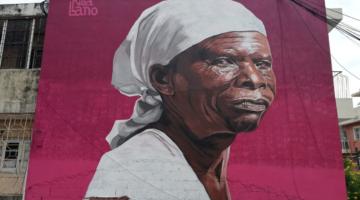The Haitian Revolution was not only a victory for the millions of enslaved Africans in the Americas, it was a victory for all working class people.”
“Abolitionist Haiti was the main campaigner against enslavement of Africans before 1888, when the enslavement process came to a kind of halt in Brazil.”
On Saturday, May 22nd, 2021, in anticipation of the global events marking African Liberation Day, the Black Alliance for Peace hosted African Liberation Day in the Americas, a webinar exploring the parallel struggles and inter-connected histories of people of African descent throughout the Americas. The webinar featured Black activists and academics from Haiti, Brazil, Colombia, Venezuela, and the United States. Together, they examined how anti-African repression extends across the geographic, national, and linguistic divisions of the hemisphere – only to be resisted by a shared culture and tradition of African revolt and autonomy. Haiti was at the center of African Liberation Day in the Americas. As Professor Gerald Horne’s remarks made clear, Haiti’s anti-slavery efforts contributed to the freedom struggles of all of the laborers and toilers throughout the Americas. For this reason, Haiti deserves the solidarity of all African peoples, and of all workers.
The foremost radical historian of our era, Dr. Gerald Horne holds the Moores Professorship of History and African American Studies at the University of Houston. He is the author of more than thirty books, including Confronting Black Jacobins: The United States, the Haitian Revolution, and the Origins of the Dominican Republic; The Apocalypse of Settler Colonialism: The Roots of Slavery, White Supremacy, and Capitalism in Seventeenth-Century North America and the Caribbean; and The Counter-Revolution of 1776 Slave Resistance and the Origins of the United States of America.
Haiti and African Liberation in the Americas
Gerald Horne:
My brief remarks will mostly be about slavery. That is to say, in the first instance, I will be laying the foundation for how and why Black people from Africa wound up in the Americas.
In the late 18th century, two profound processes unfolded in the Americas that were to have consequences for the entire hemisphere. First, in 1776, you had a revolt led by slave owners driven by the lust for indigenous land. They also felt the desire to continue and accelerate the enslavement of Africans, which they had thought might be in jeopardy because of a growing abolitionist movement – not only in the Caribbean, but also in London, itself. Second, another process began unfolding in 1791, culminating in 1804 with the Haitian Revolution. It was driven by anti-slavery.
Needless to say, the newly-born United States of America was quite hostile to revolutionary Haiti and indeed, in 1844, the US aligned with forces in a sizable portion of the island to engineer a split that led to the creation of the Dominican Republic. Haiti, on the other hand, sponsored abolitionists and anti-slavery movements. The efforts of Haiti compelled London to abandon the slave trade by 1807 and slavery itself by 1833. Interestingly, Texas (where I am now sitting) seceded from Mexico in 1836 on pro-slavery grounds because Mexico had moved to abolish slavery in the late 1820s under the leadership of Vicente Guerrero, a president of African descent.
“The efforts of Haiti compelled London to abandon the slave trade by 1807 and slavery itself by 1833.”
After Texas successfully seceded from Mexico on pro-slavery grounds, Haiti, along with an international abolitionist movement, put so much pressure on independent Texas it decided to join the United States in 1845, where it still resides. For Texas, it was an attempt to continue its slave trading operations. During its brief existence as an independent nation, Texas was a major slave trading force with slave ships flying its flag found off the coasts of Angola, Brazil, and Cuba.
Mexico, it is fair to say, was probably the major victim of U.S. expansionism -- not least because Mexico offered a refuge to enslaved Africans fleeing not only the United States, but from the Caribbean as well. As a result, we saw the United States wage war against Mexico in 1846, which led to the United States seizing a sizable portion of Mexican land, including California, which today is the wealthiest and most populous state in the United States of America and by some measures, ranks as the fifth-largest economy on planet earth. Thereafter, the United States continued to try to seize Mexican territory, often with the help of traitorous Mexican forces.
Brazil, too, was also a major victim of Washington. U.S. slave traders are largely responsible for the fact that Brazil has the largest Black population outside of West Africa itself. In the 1840s US-flagged ships could be found off the coast of Mozambique, off the coast of Angola, seizing and manacling Africans and dragging them across the Atlantic to toil in Brazil. There were powerful forces in Washington as well who wanted to execute in Brazil what they had executed in Mexico. That is to say, they had this scheme that suggested that the Amazon River was in some ways an oceanographic extension of the Mississippi River. By this logic, the United States should seize the Amazon River and indeed expel a good deal of the population of the United States of America to be enslaved workers in the Amazon River valley.
“Powerful forces in Washington wanted to execute in Brazil what they had executed in Mexico.”
Fortunately, that plan did not succeed. I should also say that all the while these diabolical schemes were taking place, it was Haiti, through its diplomatic missions, particularly in London, that was plotting against the United States. Haiti did this even though the United States did not recognize Haiti diplomatically until the U.S. civil war in the 1860s, when the United States government was on the verge of being overthrown by energized, fanatical slave owners.
Central America was also a site where Haiti and the United States clashed. It was in the 1850s that a U.S. pirate by the name of William Walker seized power with a band of cut-throats in Nicaragua with the idea of reviving the enslavement of Africans in Nicaragua which had been banned in 1838.
Once again, throughout this entire period, Haiti stood tall as the first independent Black republic campaigning on our behalf. It is fair to say that the Haitian Revolution was not only a victory for the millions of enslaved Africans in the Americas. The Haitian Revolution was also a victory for all working class people because the existence of slavery drove down the wages and working/living standards of all people who sold their labor for a living. The Haitian Revolution needs to be saluted by us all, just as independent Haiti today deserves our solidarity.
In fact, I think we should stress that there are two nations in particular that deserve the solidarity of us all. Not only the Haitian Revolution, but the Cuban Revolution -- executed successfully in 1959, 155 years after the Haitian Revolution.
Finally, let me make another point with regard to solidarity that could be considered scholarly solidarity. I proposed to the Haitian Studies Association, and there seems to be favorability towards this proposal, that we enlist an international team of researchers to dig into the archives of Caracas and Bogota in particular, but not exclusively, to uncover the documents that document how abolitionist Haiti was the main campaigner against enslavement of Africans before 1888, when the enslavement process came to a kind of halt in Brazil. That is to say, to copy and scan these documents, email them and forward them so they can be published in books, so that they can be disseminated on the internet, so that we can all gain a deeper understanding of the debt that all working class people owe to Haiti and the debt that all Black people – not only in the Americas – but worldwide owe to Haiti.
Thank you very much for your attention.
Editors, The Black Agenda Review
COMMENTS?
Please join the conversation on Black Agenda Report's Facebook page at http://facebook.com/blackagendareport
Or, you can comment by emailing us at comments@blackagendareport.com


















